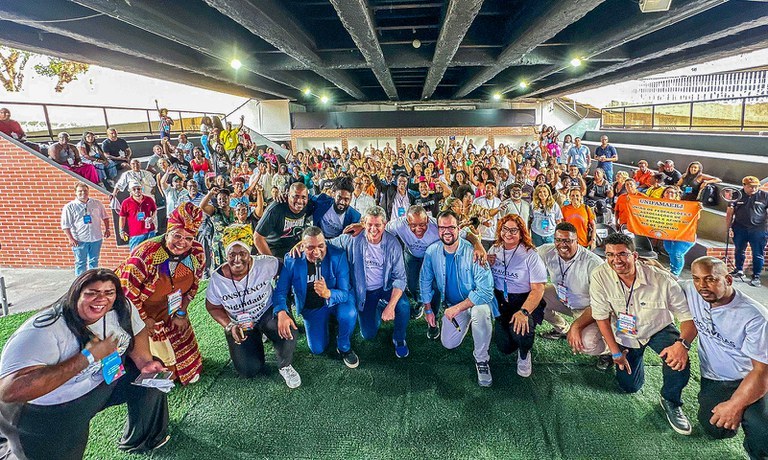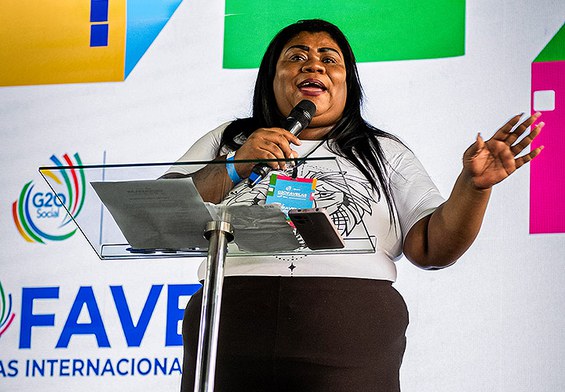The poor have their place on the G20 global agenda
State Conference of Favelas brings together, in Rio de Janeiro, 400 people in debates promoted by the G20 Favelas in the G20 Social. Minister Márcio Macêdo participates in the meeting, proposes the realization of the favela tracks within the Social Summit, and announces that, on the 14th, the organization will hold the World Meeting of Favelas within the official program of the Social Summit.

"The favela is being placed where it should be, which is at the center of the global debate, because we cannot forget these territories, we cannot let them remain on the margins of the discussion about the world economy," said the general coordinator of G20 Favelas as he opened the proceedings of the Rio de Janeiro State Conference on Favelas. The meeting is part of the G20 Social track, an initiative of the G20 Favelas led by CUFA, the Unified Center of Favelas, together with the National Antiracist Front and the Parliamentary Front of Favelas, with the seal of UNESCO Brasil.
The Minister of the General Secretariat of the Presidency of the Republic and coordinator of the G20 Social, Márcio Macêdo, participated in the activity, which takes place on the 24th of September, with 20 other simultaneous conferences in 19 states and the Federal District. "I want to say here that Cidinho and Doca, through their rap, showed Brasil what a favela is and the feelings of each person who lives there. They said: ‘I just want to be happy, walk quietly in the favela where I was born. And to be able to take pride and be aware that the poor have their place'. In the Government of President Lula and in the G20 Social, the poor have their place to live with dignity, so come with us to build this moment. The favelas that the Brazilian slave-owning elites have always treated as a problem have actually been a solution. The solution that the humblest, poorest, most needy people have found to solve a housing deficit problem caused by the policies imposed by these same elites," said the minister.
These communities have shown that they know what they want, what to do, and how to articulate, debate, and propose innovative and strategic solutions around a new global agenda that is more inclusive, sustainable, fair, and humanitarian, starting from the G20. They show how the common agenda, built from the vision of communities and people who live every day, the structural problems experienced collectively, can be faced from new partnerships and global pacts, social technologies, and innovative business models that reposition the social aspect in the geopolitical and financial agenda.
Since April, the G20 Favelas has mobilized more than 3,000 people in Brasil and 41 countries to construct this strategic agenda. Furthermore, this agenda will be validated in October with the Global Favela Forum and the National Favela Conference, when the state and international agendas will be voted on to consolidate the G20 Favelas' national and international agendas.
"We are debating and reaching a document that needs to be forwarded to the G20 Social Summit, which will take place between November 14 and 16. There, proposals from civil society in Brasil and worldwide will be debated and systematized. We will not work with divergences; we will only work with consensus. Only with what unites us, not with what separates us. The document to be delivered to the Brazilian presidency will bring the civil society consensus," mentioned Minister Márcio Macêdo.
The minister explained how the territory of the G20 Social Summit will work. The discussions will involve thematic technical meetings, statements from the engagement groups; reports from the Summit's preparatory meeting; proposals and public consultation carried out from the G20 Social Participatory digital tool, among several other innovative and inclusive actions and channels implemented by the Brazilian presidency on the G20 Social track.
"We expect the Summit to receive the participation of 50,000 people, with 5,000 in the debates alone. And I wanted to invite you, if you agree, to do the favela tracks there. To bring forward what our youth is producing in the favelas. Some people produce radio, and some people make advertising. There are people setting startups. There are people doing sewing productions. Some people organize pre-university entrance exam classes for those who do not have the necessary qualifications. There are people making art, culture. There is extraordinary work that needs to be shown. Let's show the world the face of Brasil, the face of Brazilian society, of the Brazilian favelas!” Macêdo proposed to the more than 400 favela residents gathered at the Conference at the Madureira Viaduct.
G20 Social and the favelas' voice

Vanessa Santos, a nail stylist from Irajá, Rio de Janeiro, rescheduled her clients to participate in the G20 favelas, where she was called to join in the debate about the community's demands. But before that, she researched the meaning of the word demand. And she found that it can be a request or a requirement. She added, "We are making a request; if they do not listen, we will demand it." At the conference's opening, she spoke about the importance of involving people from the favelas in world debates and presented her testimony. "I am the mother of five children. I was arrested because I wanted to support my children, I served my sentence, learned from my mistakes, and life gave me the opportunity to fulfill my mission the right way. I decided to change." I have beaten hunger. I have beaten a cancer. I am speaking from the perspective of those who know the pain, the problems, and also the ways to solve them. Only those who have felt hunger can speak about it with authority. So everyone is of utmost importance in this debate,” said Vanessa.
She presented some of the main demands that the favela communities have discussed for the G20 agenda, which deal with proposals ranging from access to public universities and job creation to the strengthening and qualification of existing public policies focused on serving less assisted territories and communities.
"Instead of proposing new things, isn't it better to take what is not working and reformulate it to make it work, tackling the difficulties faced in the Health Public System (SUS) and in the Regulation System – SISREG, for example? We are not making stuff up; we are asking because President Lula wants to listen to us. The spotlight is on us. There are no more rifles pointed at us. They want to listen to us. I know what it's like to have a rifle pointed at someone, and I have to say: 'don't shoot, it's a resident.' We will fight tooth and nail for those who have no voice, for those who cannot speak," said Vanessa.
Minister Márcio Macêdo adds: “We will not miss this opportunity that we have in Brasil at this moment. Just as you created the Cufa and had no exact notion of what it would represent, you were writing an important chapter in the history of our country's social organization. Now we are writing another important chapter, which is to include in the document for Brasil and the 20 most influential and vital economies in the world the imprints of the communities from the favelas and the world in the final document of the Summit,” said Macêdo. The minister also announced that the G20 Favelas will become part of the G20 Social Organized Committee and that, on the 14th of November and within the program of the G20 Social Summit, the G20 Favelas organization will hold the World Meeting of Favelas.